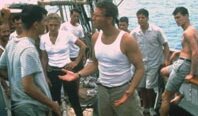|
|
| Tookey's Review |
|
| Pro Reviews |
|
| Mixed Reviews |
|
| Anti Reviews |
|
| Cast |
|
| |
 |
| |
| Released: |
1996 |
| |
|
| Genre: |
ACTION
DISASTER
DRAMA
ADVENTURE
COURTROOM
|
| |
|
| Origin: |
US |
| |
|
| Colour: |
C |
| |
|
| Length: |
128 |
|
| |
|
| |
|
|
| |
|
|
A yarn about privileged schoolboys coming of age on a schoolship (like a Wet Dead Poets Society).
|
Reviewed by Chris Tookey
|
|
Seafaring sagas come and go, but this one is unusually hard to fathom. Though based on real events in 1961, British director Ridley Scott can't make up his mind whether it is a disaster movie, a travelogue, or a mythic allegory about young Americans learning to pull together for a new society.
As the head teacher and captain, the affable, hippieish Jeff Bridges is plainly out of his depth as education's answer to Captain Bligh; while the screenplay's notion of stern discipline seems at odds with the pre-permissive Sixties - Bridges turns a blind eye to his pupils' smoking on a wooden ship, and even seems relaxed about them getting drunk, wrecking property and catching venereal diseases while in port.
The continuity problems of filming at sea are exposed early on, when crew-members battle against storm clouds and high seas, while Bridges shouts frenzied instructions in front of a clear blue sky. The climactic storm is more impressive, but follows almost two hours of lull.
Despite the film's excruciating length, there is little sense of the distances covered; and a fictitious courtroom showdown seems to exist only in order for the survivors to finish the movie with a manly group hug.
The tanned teenagers look more like aspirant film stars than real schoolchildren, and are indistinguishable except when exhibiting phobias or encountering family problems (rationed, one apiece, like ship's biscuit). There is something wrong with any film which consigns six of its leading characters to a watery grave without making us care, or even sure, who has perished. Frankly, the whole lot could have been washed overboard in the first few moments, and saved us all a lot of suffering.
|
|
MIXED
|
|
This rousing salute to the power of the elements, the lost innocence of the Kennedy era, and the goodness of young men when they are allowed to ripen with their shirts off is, above all, a tone poem. The sky never looked so blue and the oceans never heaved so awesomely as they do in this adventure saga inspired by the real story of a two-masted sailing vessel called the Albatross. Yet, oddly, because of this polished visual control, the reminiscences of former crew member Chuck Gieg, played and narrated by Party of Five's Scott Wolf, never quite come to life with the kind of intensity such a saga would suggest... These boys are fine specimens of American manhood. But they're unreachable, like ships in a bottle.
|
|
| (Lisa Schwarzbaum, Entertainment Weekly) |
|
The movie could have been smarter and more particular in the way it establishes its characters. Its underlying values are better the less you think about them. And the last scene not only ties the message together but puts about three ribbons on it. And yet, I enjoyed the movie for the sheer physical exuberance of its adventure. It is magnificently mounted and photographed. I sat up close to the screen, and was immersed in the glory of the sailing ship and the exhilaration of the voyage.
|
|
| (Roger Ebert, Chicago Sun-Times) |
|
ANTI
|
|
The movie climaxes with a manly group hug. This is, or was, a true story, but invested as it is with relentlessly cliched emotions, it plays like cheap fiction.
|
|
| (Richard Schickel, Time) |
|
Preachy and joyless... The boys are a whiny, tedious lot headed by Wolf, who explains the obvious in voice-over narration. There's your standard teacher's pet and your standard spoiled, rich kid, with all the usual rich-dad bashing... Director Ridley Scott brandishes a succession of sunsets and sails-against-the-horizon shots but lets the screen go to a chaotic muddle during the climactic storm. It's almost impossible to tell who's drowning and when. No matter. This eminently forgettable project will soon be gone with the wind.
|
|
(Ralph Novak, People Weekly).
|
|
|
|
|
